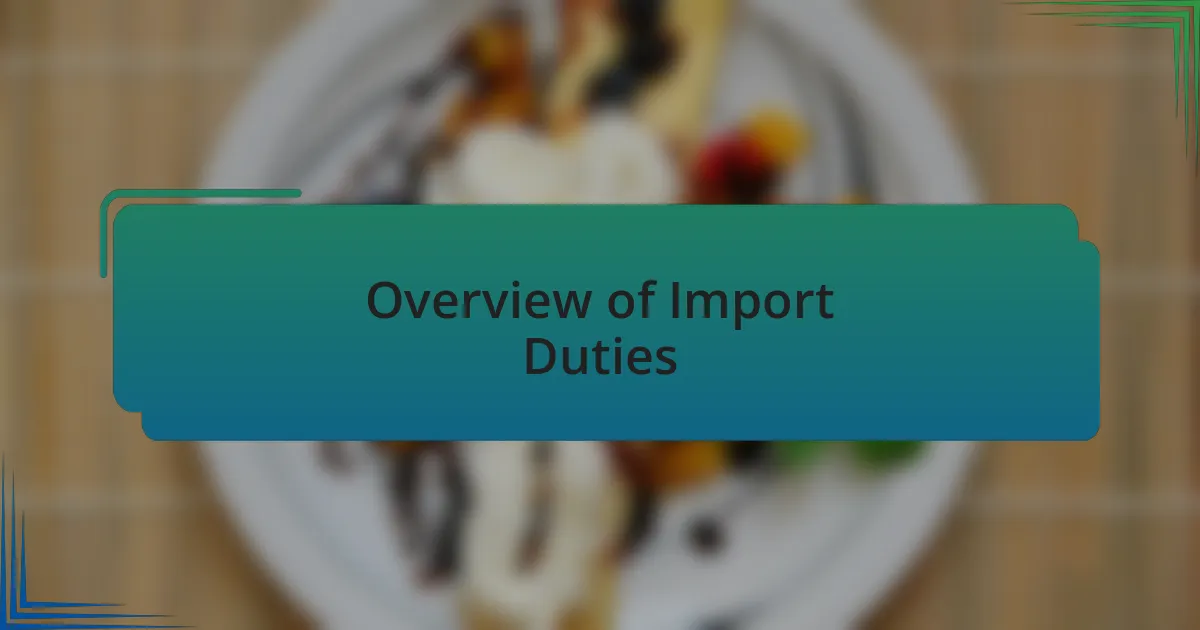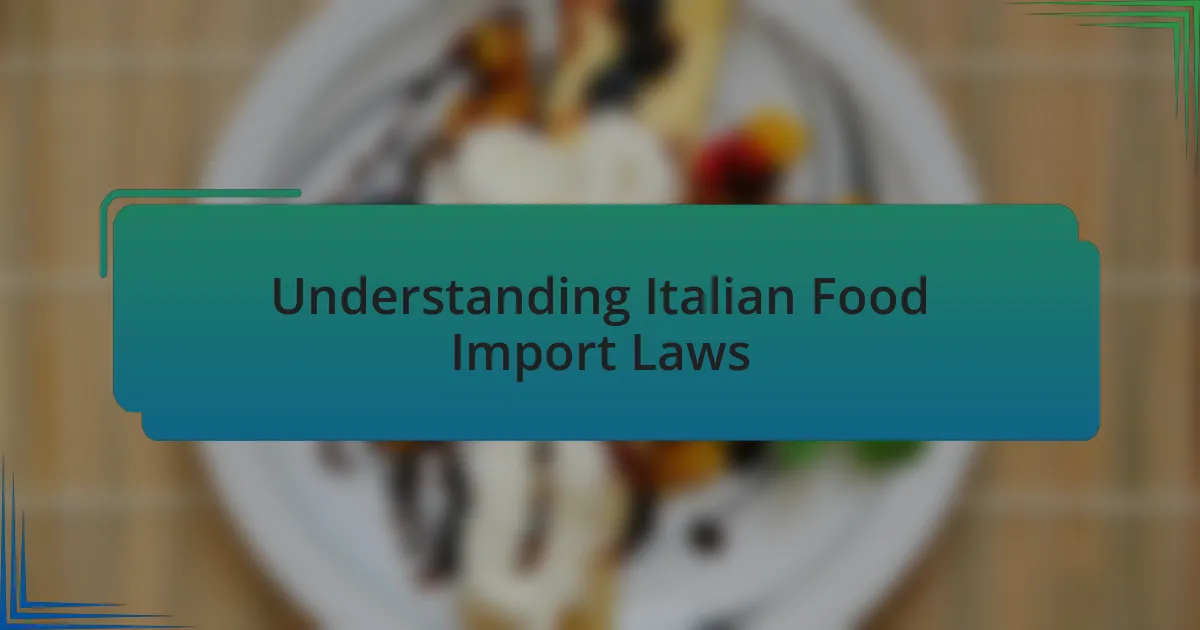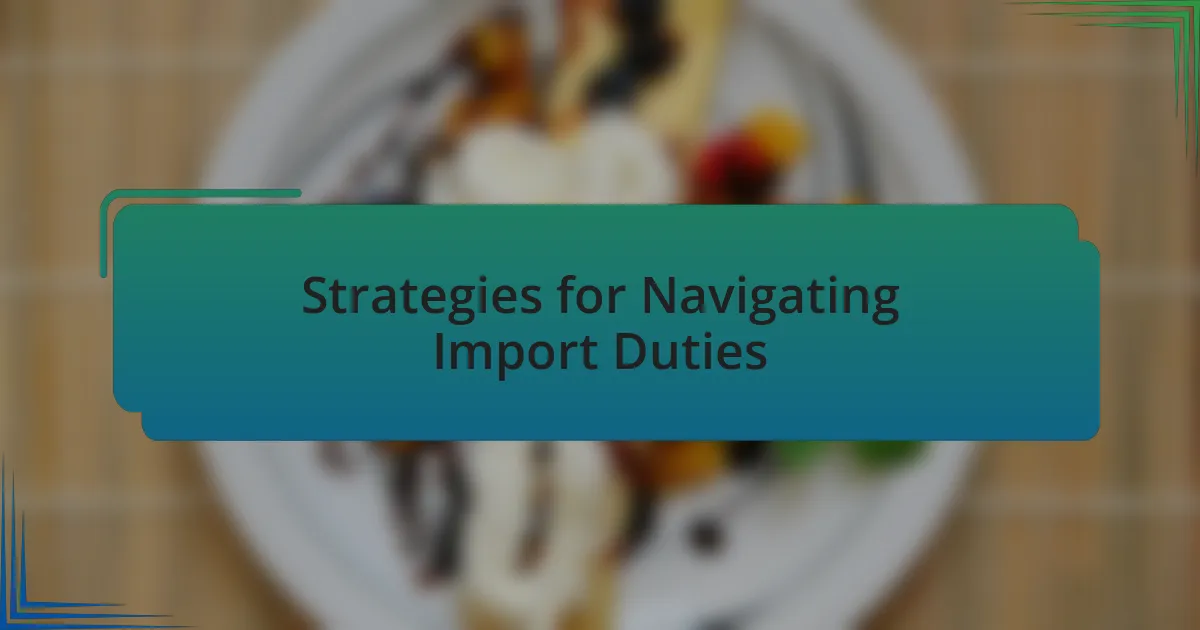Key takeaways:
- Understanding import duties varies by country and product classification; thorough research is essential to avoid costly mistakes.
- Building relationships with customs brokers can simplify the complexities of food import regulations and ensure compliance.
- Meticulous planning, clear communication with suppliers, and leveraging technology are crucial for navigating import duties effectively.
- Being adaptable and maintaining an informed network can help mitigate unexpected challenges in the import process.

Overview of Import Duties
Import duties are essentially taxes imposed by governments on goods brought into a country. When I first encountered these duties while importing Italian delicacies, I felt a mix of curiosity and frustration. Why does something as simple as bringing in artisanal pasta come with so many regulations? The intricacies of import duties can sometimes feel daunting, yet understanding them is crucial for anyone serious about food trading.
Each country has its own set of import duties, which can vary significantly based on the product’s classification. I remember the first time I mistakenly assumed that all food products were taxed at the same rate. It was an eye-opener when I learned that certain items, like aged cheeses, can carry hefty tariffs while others might be duty-free. This realization made me appreciate the need for thorough research before making any import decisions.
Navigating these duties requires attention to detail and a willingness to adapt. I often find myself asking: how can I minimize these costs without compromising quality? The answer lies in connecting with seasoned importers, utilizing resources like trade agreements, and keeping abreast of changing regulations—it’s all part of the journey in bringing authentic Italian flavors to my customers.

Understanding Italian Food Import Laws
Understanding Italian food import laws is a labyrinthine process—one that can provoke both confusion and a sense of excitement. When I first dived into these regulations, I often felt like I was deciphering an ancient manuscript. For instance, each product I sought to import had to fall into specific categories that dictated not just tariffs, but also the requisite health certifications—a detail I learned the hard way after a shipment was delayed due to missing paperwork.
As I navigated these laws, I couldn’t help but wonder, how can anyone keep up with the constant changes? It was a revelation when I started building relationships with customs brokers who understand the intricacies of Italy’s agricultural laws. They shared insights that transformed my approach. Regulations aren’t just barriers; they’re checkpoints that ensure the quality and safety of the food we cherish.
Importing Italian food isn’t just about moving products across borders—it’s about understanding the story behind each regulation. I experienced firsthand the joy of bringing in a rare bottle of extra virgin olive oil, only to grapple with stringent standards regarding labeling and traceability. Those experiences taught me that navigating import laws is a journey in itself, filled with lessons that enhance our appreciation of the food.

Strategies for Navigating Import Duties
Understanding and navigating import duties can sometimes feel like walking a tightrope. One strategy that worked wonders for me was meticulous planning. For every shipment, I made it a ritual to not only review the tariff schedules but also to consult with seasoned importers. Their firsthand experiences often highlighted nuances that I would have otherwise missed, saving me from costly mistakes.
Another key tactic I discovered is maintaining clear communication with suppliers in Italy. While discussing shipment details, I would often ask about their previous dealings with customs. Their insights offered invaluable information about which documents could make or break a shipment. Have you ever had a delivery held up due to a missing signature? I have, and it highlighted the necessity of ensuring every detail is attended to beforehand.
Finally, I found that leveraging technology can be a game changer. Tools that track import regulations and duties in real-time helped me stay ahead of the curve. They simplified the complex world of import duties into digestible bits of information. I remember the sense of relief when I realized that I could monitor changes as they happened, allowing me to adapt my import strategies on the fly. This proactive approach transformed a daunting aspect of my work into a manageable task.

Lessons Learned from My Experience
There were times when I thought I had everything figured out, only to face unexpected challenges. One unforgettable instance was when a shipment was delayed due to an overlooked documentation error. That moment, filled with anxiety and uncertainty, taught me that attention to detail isn’t just important; it’s vital. Always double-checking my paperwork became a priority after that episode.
I also learned that flexibility is key in the import process. Early in my journey, I recall being too rigid with my plans, which only led to frustration when things didn’t go as expected. A memorable instance involved a last-minute change in regulations, and I had to scramble to adjust my strategy. By embracing a more adaptable mindset, I could pivot quickly when hiccups arose, turning potential setbacks into valuable lessons.
Collaboration with others in the industry has proven to be a gem of an insight. I remember attending a trade event where I met a fellow trader who shared his own missteps with import duties. Hearing his story made me realize I wasn’t alone in navigating these choppy waters. Engaging with peers not only provided practical advice but also fostered a sense of community that supported my growth in this field.

Tips for Future Importers
When navigating the complexities of importing, one tip I can’t stress enough is to stay informed about current regulations and tariffs. I vividly remember a time when I was caught off guard by a sudden increase in import duties for a specific product. It was a wake-up call that highlighted the importance of regular updates from trade associations or government websites. How often are you checking for updates? Trust me, frequent checks can save you both money and headaches down the line.
Another crucial point is to build a reliable network of contacts, including customs brokers and suppliers. I found that establishing relationships with these professionals was essential to smoothing out the process. There was this instance when my broker helped me resolve a potential issue with a shipment that could have turned into a costly delay. Who would have thought that a simple phone call could save me so much time and stress? Surrounding yourself with knowledgeable people makes a world of difference.
Lastly, always factor in the hidden costs of importing. I once underestimated shipping fees and customs duties, thinking my initial budget was sufficient. The realization hit me hard when those costs came in much higher than expected, impacting my cash flow. I learned that planning for these unexpected expenses is as important as budgeting for the initial import. Are you prepared for surprises? I found that a buffer in my budget not only eases the financial strain but also provides peace of mind.